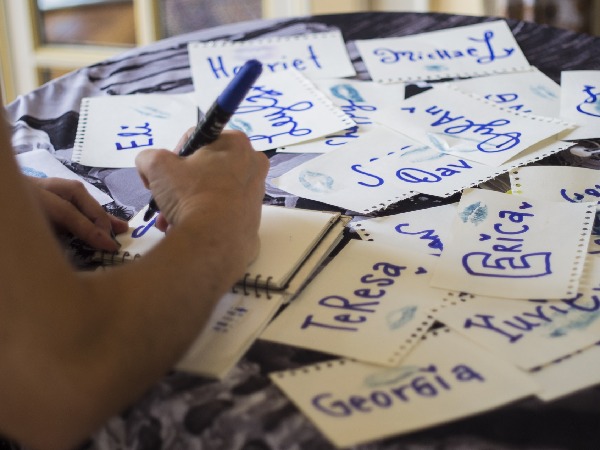😃 Subscribe for Weekly Posts:


[A] word is nothing but a painting of a fire. A name is the fire itself.
— Patrick Rothfuss, The Name of the Wind
What’s in a name? Well, not to disagree with the Bard, but everything. Sure, a rose by any other name would smell as sweet, but what about a woman named Rose? If she had a different name, would our first impression still be as sweet? When it comes to storytelling, names are powerful. Whether it’s for your protagonist or your world, a name is like a key that unlocks the rest of your story.
If you’re stuck trying to figure out what to write about, or how to start, a name could be just the inspiration you need.
Bring your story to life
When we name a character or a place, it becomes real. From Jay Gatsby to Hogwarts, names bring essential story elements out of the nebulous realm and into our new version of reality.

Every name is real. That's the nature of names.
— Jerry Spinelli

Making things up is no easy task. It would probably require less effort to write about what you did last night than it would to create a fictional account of an exciting night slaying dragons. (Although it would likely be far less interesting.)
As soon as we name a story character, it’s real. No matter how outlandish it may be, no one can tell us it doesn’t exist—because we made it exist! Names give us something tangible to hold onto as we develop our stories. You are no longer writing a story about an anonymous, undefined character. You are writing a story about Bernadette, or Rodolfo. Suddenly your character
feels more like a living, breathing person, ready to take the reins as your protagonist. The same applies to naming the setting of your narrative. Whether it’s New York City or the magical land of the Golden Domain, the door is open for you to step into your world as soon as you define it.
Grow your story from a name
George R. R. Martin believes there are two types of writers: architects and gardeners. The former are master planners, treating the act of writing as if they are building a house. He explains:
They know how many rooms are going to be in the house, what kind of roof they're going to have, where the wires are going to run, what kind of plumbing there's going to be. They have the whole thing designed and blueprinted
out before they even nail the first board up.
Gardeners, on the other hand, are more the type to go with the flow:
The gardeners dig a hole, drop in a seed and water it. They kind of know what seed it is, they know if [they] planted a fantasy seed or mystery seed or whatever. But as the plant comes up and they water it, they don't know how
many branches it's going to have, they find out as it grows.
If you have no idea what to write, how do you come up with a seed? Even if you have a general idea of the genre you’d like to explore, this may still be too broad a directive to proceed with. So plant a name or place seed, and make it a show stopper! One that will bring your ideas to life and make them blossom.


Names have a mysterious transforming power… [B]efore you realize its magical power, it’s gotten under your skin, become part of you and your destiny.
One element down, four to go


Names have a mysterious transforming power… [B]efore you realize its magical power, it’s gotten under your skin, become part of you and your destiny.
— Stefan Zweig
Names are more than strings of letters. They are central to our identities, and packed with potential. Anyone who has ever named a baby knows this to be true. Names come with expectations, which you can be upheld or subverted. They can evoke images, like the Emerald City, or Clementine. Make references to other well-known characters or real-life people who share that
name.
That’s a whole lot of possible meaning in a word or two.
Think of names as the shortest story starters imaginable. When you aren't sure what to write about, or how to continue your story, they offer multiple paths for you to take.
Let’s think back to Rose. Maybe she calls to mind a tragic love story aboard a legendary vessel, or makes you think of a character who is also a florist. Perhaps the irony is that this person with a sweet-sounding name is
not so sweet after all.
Whether they’re associated with people or places, names represent one important element of your narrative: that by their nature inform the rest. Once you have named your protagonist or storyworld, developing the
rest
of your story elements will be infinitely
easier.
The early deadline for our Spring Break short story contest is less than two weeks away. Unsure where to start? Start with a name!
Try this: Think of the first name that comes to mind. It could be for a character, or a storyworld. Then write a few sentences describing the person or place behind it. Send me your paragraph, and I’ll provide some quick feedback.
CLICK A TAB TO USE WILL.POWER
TO DO LIST:
Add tasks to your sortable list, then revel in checking them off.
SCRATCHPAD:
Cache your gems as they fall in this always accessible place.
PRIVATE JOURNAL:
Reflect on your process — good, bad and ugly — in your dated diary.
TRACKING:
Measure your progress with key writing metrics, automatically,
TO DO LIST:
Add tasks to your sortable list, then revel in checking them off.
SCRATCHPAD:
Cache your gems as they fall in this always accessible place.
PRIVATE JOURNAL:
Reflect on your process — good, bad and ugly — in your dated diary.
TRACKING:
Measure your progress with key writing metrics, automatically,
ADD DO
Show Dones
Metric:
ADD
Words
Minutes
Click anywhere to close